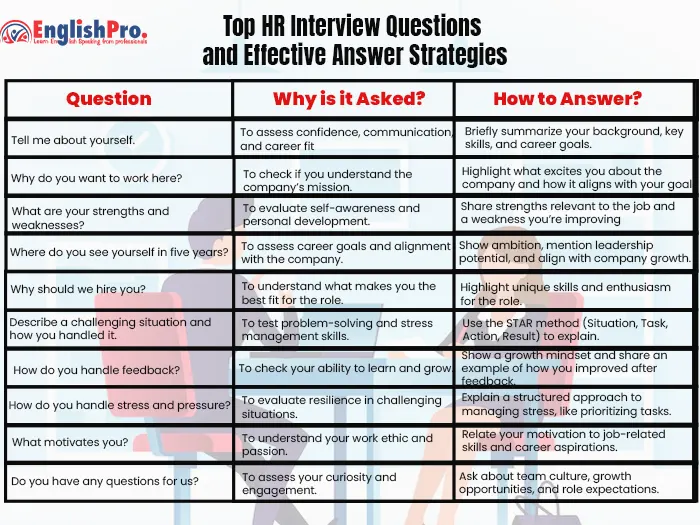Introduction
Technical expertise alone is insufficient for job security because strong interpersonal skills are equally necessary. HR interviews serve as an essential tool for evaluating candidates’ compatibility with company culture while assessing their communication abilities and problem-solving capacities. By 2025, HR professionals will emphasize adaptability and resilience alongside emotional intelligence as their primary assessment criteria.
This article examines the leading HR interview questions while offering successful responses and advice to help you distinguish yourself.
1. Tell me about yourself.
Why is this asked?
HR professionals ask this question to assess your self-assurance as well as your ability to communicate effectively and understand your professional direction.
How to answer?
Start with a brief professional background.
Highlight key skills and achievements.
Relate your experience to the job role.
Example Answer:
My name is [Sam] and I have 10 years of professional experience in the field of [Computer Networks] where I have consistently delivered results. My expertise lies in [Networking] while my position at [xyz infotech] helped me advance [networking]. The opportunity excites me because it matches my passion for the networking field.
2. Why do you want to work here?
Why is this asked?
Recruiters ask this question to determine whether you understand their company’s mission and whether your personal beliefs match their organizational values.
How to answer?
Mention what excites you about the company.
Relate it to your career goals.
Show how you can contribute.
Example Answer:
I respect [Company Name] because of its dedication to [Value/Industry] through innovative practices. Moreover, the organization’s dedication to [Specific Area] matches my enthusiasm for [Field]. Further, my abilities in [Skill] will help your team achieve success.
3. What are your strengths and weaknesses?
Why is this asked?
HR aims to evaluate your understanding of your abilities and your capacity for personal growth.
How to answer?
Select a personal strength that matches the requirements of the role.
Pick a weakness you’re actively improving.
Example Answer:
One of my strengths is problem-solving. In fact, I derive satisfaction from analyzing problems to develop effective solutions. During my last position, I improved a process which resulted in a 20% time saving for my team.
My weakness used to be difficulty in delegating tasks. I have been actively addressing this weakness by developing trust in my team’s capabilities and making collaboration my focus.
4. What are your career goals for the next five years?
Why is this asked?
Employers look to determine whether your long-term career aspirations match their organizational objectives.
How to answer?
Show ambition while staying realistic.
Align your goals with company growth.
Example Answer:
By the time five years have passed, I will be leading teams while mentoring newcomers and participating in high-level company strategy development. At [Company Name] I have the perfect opportunity to expand my skills in [Industry].
5. Why should we hire you?
Why is this asked?
HR professionals need to discover your unique attributes that qualify you as the ideal candidate for the position.
How to answer?
Highlight your unique skills.
Show enthusiasm for the role.
Example Answer:
My expertise in [Key Skill] combined with my history of successful [Specific Achievement] forms the foundation of my professional profile. The skill I possess in [Problem-Solving Skills] assures me that I can make meaningful contributions to your overall team. I feel strongly about [Industry] and am thrilled to have the chance to develop my career at [Company Name].
6. Please explain a difficult situation you encountered and describe your approach to resolving it.
Why is this asked?
The human resources department wishes to assess how you approach problems and manage stress during difficult times.
How to answer?
When answering behavioral interview questions apply the STAR method which stands for Situation, Task, Action, and Result.
Example Answer:
My former employer gave us a major project that had a very tight deadline to meet (Situation). I managed our team’s efforts to achieve quality standards as required for the project. I redesigned our work process and assigned tasks appropriately while boosting team morale through motivation. The project finished two days ahead of schedule which earned us outstanding client feedback (Result).
7. How do you handle feedback?
Why is this asked?
Organizations appreciate workers who demonstrate a willingness to develop their skills.
How to answer?
Show a growth mindset.
Provide a real-life example.
Example Answer:
I surely consider feedback as a chance to develop my abilities. In fact, my previous manager recommended that I focus on enhancing my presentation abilities. My confidence grew substantially after I participated in online courses and also received mentorship. I deliver presentations with complete confidence aa well as transparency today.
8. How do you handle stress and pressure?
Why is this asked?
HR needs to determine whether you can function effectively when faced with difficult circumstances.
How to answer?
Show resilience and problem-solving skills.
Provide a practical strategy.
Example Answer:
To manage stress I further focus on task prioritization and structured workflows. In high-pressure situations, I undoubtedly separate tasks into smaller steps and assign achievable deadlines. By employing this method I overall maintained high quality across numerous projects.
9. What motivates you?
Why is this asked?
Human resources experts seek to identify your main driving force so they understand why you perform at your best.
How to answer?
Relate your motivation to the job, indeed.
Example Answer:
Further, professional growth through challenging situations serves as my biggest motivation. I find problem-solving stimulating while continuously learning new skills and supporting team achievements. The overall visible outcomes of my work efforts bring me great fulfillment.
10. Do you have any questions for us?
Why is this asked?
Your inquiry demonstrates your enthusiasm about joining the company and also the specific position.
How to answer?
Ask about the organization’s culture as well as prospects for professional development and what this position entails.
Example Questions:
- What does the team look like that I will be joining?
- What advancement opportunities exist within your organization?
- What qualities or achievements does this company associate with success in this position?

Final Tips for HR Interviews
Research the Company: Study the company’s guiding principles together with its mission statement and workplace culture.
Practice Common Questions: Practice your responses until they come across as both assertive and genuine.
Be Honest: Authenticity builds trust and also support.
Use Professional Body Language: Moreover, maintain eye contact and a positive demeanor.
Follow-up: Express gratitude through a thank-you email following your interview.
HR interviews provide you with an opportunity to demonstrate your character traits and professional capabilities as well as your suitability for the organization. Your job prospects will improve greatly if you prepare thoroughly and respond with confidence. Approach your interview with positivity and authenticity to treat it as a growth experience.


Recent Comments